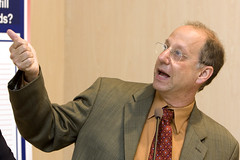
Dave Weinberger is speaking about "knowing." He starts by asking if "the 'Net is exceptional in the same way of the printing press?"
There are five things that everyone who goes on the Web knows:
- There an abundance of stuff--good and bad
- The 'Net is a permission-free zone
- There is no principle of organization on the 'Net and if there were, it wouldn't be better, it would be worse
- Realize that we built this and its ours
- The 'Net is filled with hyperlinks.
These are unexpected results.
The hyperlink is important because by connecting things, it lets them fall apart. But why do they fall apart? Why do we take advantage of this?
Things that we thought were held together by something important were held together by library paste. Encyclopedias fell apart and become Wikipedia. Newspapers disaggregated. Albums fell apart. These are the easy cases.
Long-form writing, something we believe is vastly improved by being tightly held together is a harder case. Long form writing is a bunch of short pieces held together by deductive reasoning. We proceed from A to Z through a series of steps. There are some weaknesses in this model:
- The author must imagine all the objections and react to them
- The author must avoid digressions that will distract the reader from the path the author wants to lead you down
- Very few long-form writings work
The opposite isn't short-form thought. The opposite is "web-form" thought. Web-form thought is done in public and is constantly being revised--if not by the author, by the things that link to it. The web-form work is never consistent and shapeless.
Knowledge has three shapes:
- A pyramid: data, information, knowledge, wisdom
- A foundation, a bottom. Made from hard rock upon which we can build and extend arguments.
- A rectangle, a book. The media that has contain and communicated knowledge has been a page of a book. Books bound knowledge to brain-sized chuck.
The fact that knowledge is a pyramid means we can reduce it. The foundation means we can resolve arguments. The rectangle means we can master knowledge.
All these characteristics spring from the medium--paper--know knowledge itself. Paper is expensive and libraries are small. Books have to be published and this have an end. Books don't have links and they have ends. Our strategy for mastering knowledge has been one of reduction. Libraries and books don't scale--but the 'Net does.
Knowledge without shape. Clay Shirky's "filter failure" quote is referenced again. In a library the filtering happens when the librarian "doesn't buy" a book. You don't see that. On the 'Net you see the everything so you can look past the filters any time you want. We are not "filtering out" but "filtering forward." This changes the nature of the filter. Filters are "just some kid's playlist."
Traditional knowledge has functioned as a stopping point. These stopping points are backed-up by credentialed sources. This system has the capability of being corrupted because of the power of authority. The 'Net on the other hand is a place of differences and disagreements.
Hyperlinks blow apart the rectangle. Hyperlinks are a new kind of punctuation. Regular punctuation tells you when to stop, but hyperlinks tell you where to go next.
Is the 'Net exceptional? "Hell, yes!"




